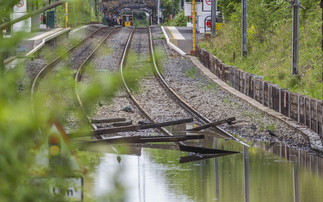The government's chronic mishandling of the pandemic does not bode well for the challenging net zero transition it now has to navigate
It's no way to run a country. One of the many downsides of political tribalism is the myopia it induces. It should be possible to welcome the government's ability to 'get Brexit done' and accept Boris Johnson's argument that a functioning Covid-19 strategy has been derailed by a mutant variant of the virus, while also acknowledging that giving businesses a week to prepare for a new 1,200 page trade deal and schools 12 hours to prepare for a switch to remote learning proves something has gone badly wrong at the heart of the British state. The ends can justify the means, but that doesn't mean the means have to be so catastrophically incompetent and chaotic. And yet there is scant evidence that such reflection is underway within government or amongst its media outriders. Instead we are all forced to live with the consequences of precisely the same mistakes being repeated over and over, of the Seinfeld motto - 'no hugging, no learning' - as governance model.
Less than a fortnight ago many businesses shut up shop for the festive period, still uncertain as to whether or not a Brexit trade deal would be finalised and with a creeping certainty that the system of tiered coronavirus controls would have to be expanded. However, they also harboured an optimistic belief they had weathered the worst of the economic storm and could start to position themselves for a post-Brexit, post-pandemic recovery.
They return to work this week to face a crisis that could yet prove to be even worse than the initial wave of Covid infections last Spring. A welcome Brexit trade deal was finalised at the 11th hour and 'no deal' chaos was averted, but businesses now have to adapt to new non-tariff barriers that the Prime Minister insists do not exist, while also navigating 'Lockdown 3: This time it's sleeting'. We are all paying the heaviest of prices for the government's desire to generate a few positive headlines in the run up to Christmas.
It is a lockdown that is set to be considerably longer and more economically damaging than would otherwise have been the case, after the government again repeated the pattern of ignoring advice, allowing the situation to worsen, before then belatedly enacting measures it had insisted just days earlier were not necessary. This shamelessly foresight-averse approach to government culminated in the deadly tragedy disguised as farce that yesterday saw around three million children return to school for a single virus-mingling day. To paraphrase the great philosopher-king of the age, Joey Tribbiani, pigeons learn faster than some members of the Cabinet.
The big worry for the green economy and the net zero transition is that the myriad weaknesses and misjudgements of the past few months could have significant negative implications for the UK's climate agenda. The hope is that the lessons learned from the pandemic and the eventual post-crisis recovery can combine to drive a new wave of accelerated climate action. As this bleakest of Januaries gets underway it feels like it could go either way.
The first order impact of the latest wave of the pandemic is the most obvious and immediate concern. Against a backdrop of hospitals that are already on the brink of being overwhelmed, three conflicting and inter-related forces are now wrestling to determine our fates over the coming weeks and months: a new more contagious mutant strain of the virus (and the possibility of further strains); a lockdown that is hugely disruptive, but less stringent than the one imposed last Spring; and the roll out of vaccines that appear to work. It is impossible at this stage to know whether a successful vaccine roll out and lockdown will allow schools and the wider economy to re-open within six weeks or so, or whether we are at the start of a full blown health catastrophe that will take many months to recover from and would increase the risk of further mutations that require new vaccines.
As a result, green businesses that had hoped 2021 would deliver the deferred 'year of climate action' that 2020 promised to be now face another indeterminate period of operational disruption, economic headwinds, and overstretched policymaking bandwidth. They are once again required to hope for the best, but plan for the worst.
However, there are also longer term concerns to consider that have been amplified by the past few months of bungled crisis management. The good news is the current crisis will eventually pass and the various welcome climate policy announcements from the government over the autumn suggests that the net zero transition will be right at the heart of Ministers' recovery plans. Boris Johnson has made clear that he envisages a clean tech powered voyage towards the post-Brexit, post-pandemic sunlit uplands and has started to sketch out the roadmap for getting there. But despite the encouraging rhetoric and policy measures, the past month provides far too many reasons to fear the route ahead will be tumultuous and treacherous.
Brexit may have been completed, but the promised Green Brexit is still far from guaranteed. Precisely the same dithering, triangulation, and party management that has characterised Johnson's handling of the pandemic has defined his Brexit strategy. As such, his Brexit deal may represent a 'cakeist' triumph for Johnson's cheerleaders, but for many businesses and campaigners it is a strange beast, neither fish nor fowl.
There is no doubt that it offers considerable opportunities for the green economy, providing a chance to reform agricultural subsidies, while enabling continued close co-operation with the EU on emissions trading, environmental standards, and multi-lateral climate diplomacy. But at the same time there are reasons why some of the most vocal opponents of climate action were celebrating on News Year Eve. They envisage a path towards rapid deregulation and the roll back of numerous environmental policies. They have made no secret of their plans for the future of the UK as a tax-haven-on-Thames and are not about to stop lobbying for it now the country has left the EU.
For all Ministers' talk of world-leading environmental standards they have purposefully declined to strengthen legal safeguards or build out the institutional capacity that is supposed to help deliver the promised 'green Brexit'. Critics of climate action are encouraged, even if their influence looks more marginal than ever. The legitimate concern is the pandering to contrarian MPs and media commentators that has so clearly informed Johnson's inability to take early decisions to try and control the virus could similarly undermine his green Brexit vision.
And the same desire to avoid a row with certain libertarian interests while ducking and deferring difficult decisions could yet hamper the government's wider decarbonisation strategy. The Treasury's recent interim review of the cost of the net zero transition was unequivocal about the financial fallout from political dithering. "Uncertainty about how government policy will evolve across the transition can push up financing costs or deter investment entirely as the private sector awaits government decisions," it warned. "This can increase costs if decisions are delayed sub-optimally."
As has been well documented, the government's net zero strategy is on the cusp of a period of rapid evolution when crucial decisions on everything from heat pumps and hydrogen to rail investment and aviation capacity need to be made. Ministers and civil servants have laid a lot of impressive groundwork for these critical policy decisions and some welcome steps have already been taken - witness the ambitious new sixth carbon budget and phase out date for petrol and diesel cars. But now an avalanche of further decisions need to be made and some of them are likely to prove controversial. Is Johnson going to make them?
Again, there are some legitimate reasons to be optimistic. The government's track record on decarbonisation is arguably better than it is against any of its other policy goals. The pursuit of net zero emissions is increasingly embedded as a top priority across government and the argument that the transition is good for the economy and clearly in the national interest has been won. Johnson's boosterish political skillset is clearly much better suited to selling the vision of a prosperous clean tech-enabled future than it is managing the minutiae of exponential infection curves. It is possible the vaccine - one of the areas where the government's planning does appear to be in anticipation of, rather than badly lagging events - will ride to the rescue and trigger a belated year of climate action that culminates in a COP26 Summit that serves as a celebration of multilateralism and lays the foundations for a decade of green industrial revolution. But it is also easy to see how the pandemic could worsen further and Johnson's apparently temperamental inability to take tough decisions and follow a clear long term strategy could delay urgently needed progress in tackling both the coronavirus and the climate crisis.
The hope remains that the right lessons will eventually be learned from the pandemic. That the government and the wider political class will internalise the importance of decisive early action in the face of escalating risks, that the neglected skills of crisis management, long term planning, investment in the public sphere, and unglamorous but effective governance are valued once more. The opportunity to build back better is still there. But as we all hunker down for our third lockdown inside a year, as strangely influential Covid-sceptics continue to pollute the discourse, and as lessons remain unlearned in classrooms and Whitehall corridors alike, it feels hard to be as optimistic as we should be.
A version of this article originally appeared in the BusinessGreen Overnight Briefing newsletter, which is available to all BusinessGreen subscribers.









